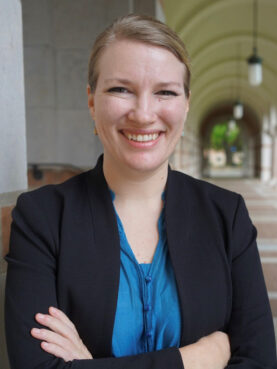A white evangelical woman who is a nurse in Tennessee said her co-workers at a previous job “would call me ‘Ms. Holy,’ because some employees … would want to break protocol or break the rules,” she told researchers, adding that she just wanted to follow her employer’s policies.

Rachel Schneider. Photo courtesy of Rice University
In another example, a Latina evangelical in Tennessee said co-workers at a previous job “would make fun of me because I didn’t talk or participate in their tasteless conversations, saying, ‘Oh, there’s the hallelujah, or the sanctimonious person.’” Also, a Black evangelical man, working as a criminal investigator in Texas, told researchers “there’s kind of this theme out there that Christians are inherently judgmental and hypocritical.”
For Christian women of color, in particular, ”there was this sense that people just made assumptions that they wouldn’t want to be included in social gatherings because they perceived things like ‘they didn’t drink,’” Schneider said. They would be excluded due to “perceived moral lifestyle differences,” she added.
The report’s authors make it clear that Christian perceptions of discrimination don’t “carry the same risk for violence that religious minorities experience.”
“Yet it is important to recognize that Christians do perceive religious discrimination and othering in the workplace in ways that feel demeaning, prejudicial, or exclusionary, and this should not be dismissed by researchers,” the authors said in the report.
As for the nonreligious, respondents felt compelled to downplay or hide their identities.
A nonreligious Latino man working as a security guard in California told researchers he would speak softly when expressing his views due to fear of ”being reprimanded, disciplined, or fired if something was taken out of context.”
A Black agnostic engineer in Arizona said she “was hesitant to reveal her agnosticism because she was already a ‘triple minority’ in the workplace as the youngest employee and a Black woman,” according to the report.
To Schneider, it’s important employers recognize that religious discrimination in the workplace could lead to workers feeling “marginalized and stigmatized” and “may impact their ability to retain employees.”
Schneider said employers should offer training on religious discrimination.
“We all know employees are often, these days, given diversity training, but in another aspect of our study we asked how often religion came up in those kind of trainings and it was hardly ever,” she said. “If it did, it came up only in a very superficial way.”
This article originally appeared here.

